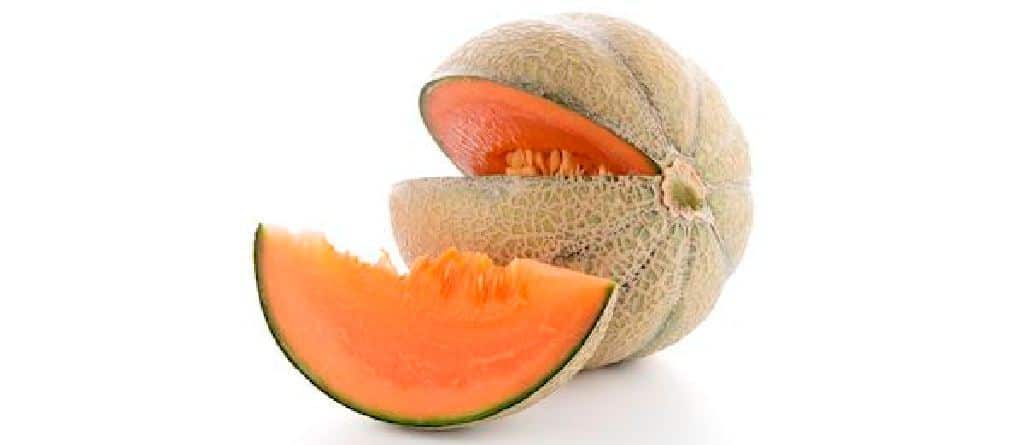Why Does My Cantaloupe Tastes Sour and Fizzy Like Vinegar?

Have you ever picked up a cantaloupe from the grocery store, eagerly sliced it open, and taken a big, juicy bite, only to be met with a sour, fizzy taste that resembles vinegar?
It’s a frustrating experience that can leave you feeling disappointed and confused. After all, cantaloupes are supposed to be sweet and refreshing, right? So, what went wrong?
There are several reasons why your cantaloupe might taste sour and fizzy, and in this article, we’re going to explore them all. From overripe fruit to bacterial contamination, we’ll take a deep dive into the possible causes of this unpleasant taste and discuss how to avoid it in the future.
So, if you’ve ever wondered why your cantaloupe tasted off, this article is for you. Let’s get started!
Cantaloupe Description and Nutritional Value
Cantaloupe, also known as muskmelon, is a delicious and nutritious fruit that belongs to the Cucurbitaceae family. It has a smooth, ribbed, and netted rind that surrounds its sweet and juicy flesh.
The fruit’s interior is orange or yellow with a small seed cavity in the center, and its flavor is similar to that of honeydew melon but with a more distinct sweetness.
Cantaloupe is not only delicious but also packed with nutrients. It has a lot of vitamins A and C, which are important for keeping your eyes, skin, and immune system healthy. Cantaloupe is also full of potassium, which helps control blood pressure and keep the heart healthy. It also contains dietary fiber, which aids in digestion and keeps the bowels healthy.
Cantaloupe’s low calories and high nutrient content make it an ideal food for those who want to maintain a healthy diet. It is also perfect for people who want to lose weight, as it is low in calories and high in fiber, which helps keep you feeling full for longer periods of time.
Why Does My Cantaloupe Tastes Sour and Fizzy Like Vinegar?
Cantaloupes are known for their sweet and juicy flavor, which makes them a popular summertime fruit. However, there are instances where the cantaloupe can taste sour and fizzy, almost like vinegar. This is a sign that the fruit is undergoing fermentation, which can be due to a number of causes.
Fermentation is a natural process that happens when yeast and bacteria break down the sugars in fruit, making alcohol and carbon dioxide. Fermentation is usually linked to beer, wine, and other alcoholic drinks, but it can also happen in cantaloupe and other fruits.
Cantaloupes contain a high amount of sugar, making them an attractive target for microorganisms that thrive on sugar. Yeast and bacteria are two microorganisms that are commonly found on the surface of fruits and vegetables, including cantaloupes. When these microorganisms come into contact with the sugars in the fruit, they begin to feed on them, producing alcohol and carbon dioxide as byproducts.
The storage conditions for cantaloupes can also have an impact on the fermentation process. High humidity and warm temperatures make it easy for microorganisms to grow and multiply, which speeds up the process of fermentation. Contamination is another factor that can contribute to the fermentation of cantaloupes.
If the fruit comes into contact with contaminated water or soil, it can pick up bacteria or mold, which can lead to fermentation.
While fermentation is a natural process, it can have negative effects on the taste and safety of cantaloupes. A fizzy taste in cantaloupe is a sign that the fruit is undergoing fermentation, and it can also indicate the presence of harmful microorganisms, such as bacteria or mold. If you eat these microorganisms, you could get food poisoning or other illnesses, so it’s important to stop cantaloupes from going bad.
Contamination is another cause of the sour and fizzy taste in cantaloupe. If the fruit comes into contact with contaminated water or soil, it can pick up bacteria or mold, which can lead to fermentation. Pesticides can also cause the fruit to become contaminated, leading to a sour and fizzy taste.
Is Fermented Cantaloupe Safe To Eat?

Fermentation is a natural process that happens when bacteria and yeast break down the sugars in fruits and vegetables. While fermentation is a popular method for preserving food and enhancing its flavor, it is important to ensure that the fermented food is safe to eat. So, the question arises: Is fermented cantaloupe safe to eat?
The short answer is that it depends on the specific situation. In general, a small amount of fermentation in cantaloupe is not necessarily harmful, and some people even enjoy the tangy, fizzy taste that fermentation can produce. However, if the fermentation process has gone too far, harmful bacteria may be present, and the cantaloupe may not be safe to eat.
To determine whether fermented cantaloupe is safe to eat, there are a few things to consider. First, how long has the cantaloupe been fermenting? The longer the fermentation process goes on, the more likely it is that harmful bacteria will be present. Second, what is the condition of the cantaloupe?
WARNING
If the cantaloupe is moldy or has a strong, unpleasant odor, it is likely spoiled and should not be consumed.
It is also important to consider the individual’s health and any underlying medical conditions. People with weak immune systems, pregnant women, and young children are more likely to get sick from eating fermented foods and should be careful when eating them.
If you are unsure whether fermented cantaloupe is safe to eat, it is always best to err on the side of caution and discard it. To prevent fermentation and the risk of harmful bacteria, it is important to properly store cantaloupes in a cool, dry place, wash them thoroughly before consuming them, handle them properly, and purchase fresh, high-quality cantaloupes.
How to Prevent the Fermentation Process in Cantaloupe?
Because cantaloupes contain yeast and bacteria, fermentation is a natural process that can happen to them. While fermentation is not necessarily harmful, it can affect the taste and safety of the fruit. A fizzy taste in cantaloupe is a sign of fermentation, which can be caused by microorganisms that are bad for you. Therefore, it is essential to take steps to prevent fermentation in cantaloupes.
- One of the most effective ways to prevent fermentation in cantaloupes is to store them in the right conditions. Cantaloupes should be stored in a cool, dry place away from direct sunlight. High humidity and warm temperatures provide an ideal environment for microorganisms to thrive, leading to faster fermentation. Therefore, it is important to store cantaloupes in a cool, dry place, such as a refrigerator or a pantry, to slow down the fermentation process and prevent microorganisms from multiplying.
- Another way to prevent fermentation in cantaloupes is to wash them thoroughly before consuming them. Washing cantaloupes before eating can help remove any surface microorganisms that may be present, reducing the likelihood of fermentation. To wash a cantaloupe, rinse it under cold running water and scrub it gently with a clean brush. Dry the cantaloupe with a clean towel or paper towel before slicing or consuming it.
- It is also essential to handle cantaloupes properly to prevent fermentation. Always wash your hands thoroughly before handling cantaloupes to prevent the transfer of harmful microorganisms. Use clean cutting boards and utensils when preparing cantaloupes, and wash them thoroughly with soap and hot water after each use. If you notice any signs of spoilage, such as a foul odor or soft spots, discard the cantaloupe immediately.
- Lastly, it is important to purchase fresh, high-quality cantaloupes to reduce the risk of fermentation. Choose cantaloupes that are firm and free from bruises or soft spots. If possible, buy cantaloupes that are still attached to the vine, as they tend to be fresher and more flavorful.
Signs of a Ripe Cantaloupe: Texture, Smell, and Appearance
Determining the ripeness of a cantaloupe is key to ensuring that it tastes sweet and juicy. There are several signs that can help you determine whether a cantaloupe is ripe or not, including its texture, smell, and appearance.
- First of all, a ripe cantaloupe should feel firm but give a little when gently pressed. It should not feel too hard or too soft, and there should be a slight give when you press it with your fingers. If it is too hard, it may not be ripe enough, and if it’s too soft, it may be overripe and may have already begun to spoil.
- Secondly, the smell of a ripe cantaloupe is another indicator of its ripeness. A ripe cantaloupe should have a sweet, floral aroma that is easily noticeable. If the cantaloupe does not have any smell, it may not be fully ripe yet.
- Finally, the appearance of a ripe cantaloupe should also be taken into account. A ripe cantaloupe should have a golden-yellow or orange color that is uniform all around its surface. The rind should also have a rough texture with well-defined netting. If the color is too green, the fruit may not be ripe yet, and if it’s too yellow or brown, it may be overripe and may have already begun to spoil.
It’s important to note that cantaloupes do not continue to ripen once they are picked. So, it is essential to choose a ripe cantaloupe when buying one to ensure that it will taste sweet and juicy.






